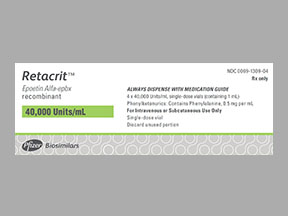
Retacrit Coupons & Savings Card – Discount Prices from $461.23
My prescription
Edit
1ML of 40000UNIT/ML, Retacrit (1 Vial)
Select pharmacy

CVS
$476.34
COUPON PRICE
Walgreens
$461.23
COUPON PRICE
Albertsons
$471.94
COUPON PRICE
Walmart
$476.73
COUPON PRICERetacrit savings card
Show this card to your pharmacist
Walgreens
$461.23
BIN
ID
PCN
GRP
019876
LH17894022
CHIPPO
LHX
Powered by
Related erythropoiesis-stimulating agents prescriptions
More prescriptions for kidney disease
Related erythropoiesis-stimulating agents prescriptions
More prescriptions for kidney disease
Price history for Retacrit
1 Vial, 1ML of 40000UNIT/ML
Average retail price for Retacrit
Average SaveHealth price for Retacrit
Our price history data is based on aggregated prescription data collected from participating pharmacies in America. Our prescription data updates daily to reflect the latest price changes. If you notice a missing data point, it means there wasn't sufficient data available to generate a monetary value for that date.
*Retail prices are based on pharmacy claims data, and may not be accurate when we don't have enough claims.
Retacrit dosage forms
Dosage Quantity Price from Per unit 1ML of 40000UNIT/ML 1 Vial $461.23 $461.23 1ML of 2000UNIT/ML 1 Vial $14.90 $14.90 1ML of 2000UNIT/ML 2 Vials $37.80 $18.90 1ML of 2000UNIT/ML 3 Vials $60.69 $20.23 1ML of 3000UNIT/ML 1 Vial $28.53 $28.53 1ML of 3000UNIT/ML 2 Vials $65.05 $32.52 1ML of 3000UNIT/ML 3 Vials $101.58 $33.86 1ML of 4000UNIT/ML 1 Vial $37.80 $37.80 1ML of 4000UNIT/ML 2 Vials $83.59 $41.80 1ML of 4000UNIT/ML 3 Vials $129.39 $43.13
| Dosage | Quantity | Price from | Per unit |
|---|---|---|---|
| 1ML of 40000UNIT/ML | 1 Vial | $461.23 | $461.23 |
| 1ML of 2000UNIT/ML | 1 Vial | $14.90 | $14.90 |
| 1ML of 2000UNIT/ML | 2 Vials | $37.80 | $18.90 |
| 1ML of 2000UNIT/ML | 3 Vials | $60.69 | $20.23 |
| 1ML of 3000UNIT/ML | 1 Vial | $28.53 | $28.53 |
| 1ML of 3000UNIT/ML | 2 Vials | $65.05 | $32.52 |
| 1ML of 3000UNIT/ML | 3 Vials | $101.58 | $33.86 |
| 1ML of 4000UNIT/ML | 1 Vial | $37.80 | $37.80 |
| 1ML of 4000UNIT/ML | 2 Vials | $83.59 | $41.80 |
| 1ML of 4000UNIT/ML | 3 Vials | $129.39 | $43.13 |
| 1ML of 10000UNIT/ML | 1 Vial | $109.11 | $109.11 |
| 1ML of 10000UNIT/ML | 2 Vials | $226.23 | $113.11 |
| 1ML of 10000UNIT/ML | 3 Vials | $343.34 | $114.45 |
| 1ML of 20000UNIT/ML | 1 Vial | $224.49 | $224.49 |
| 1ML of 20000UNIT/ML | 2 Vials | $456.97 | $228.49 |
| 1ML of 20000UNIT/ML | 3 Vials | $688.87 | $229.62 |
| 1ML of 40000UNIT/ML | 2 Vials | $930.46 | $465.23 |
| 1ML of 40000UNIT/ML | 3 Vials | $1392.42 | $464.14 |
What is the medication retacrit used for?
Retacrit is used to treat anemia, which is a condition characterized by a deficiency of red blood cells. It is often prescribed for patients with chronic kidney disease, those undergoing chemotherapy, or individuals with certain other medical conditions that lead to anemia. Retacrit works by stimulating the bone marrow to produce more red blood cells, thereby increasing the oxygen-carrying capacity of the blood.
Is retacrit the same as Procrit?
Retacrit and Procrit are both brand names for the drug epoetin alfa, which is used to treat anemia. They are considered biosimilars, meaning Retacrit is highly similar to Procrit in terms of safety, purity, and potency. However, they may have different inactive ingredients or formulations. It is important for patients to follow their healthcare provider's guidance when switching between these medications.
How much is retacrit compared to Procrit?
The cost of Retacrit is generally lower compared to Procrit. However, prices can vary based on factors such as location, insurance coverage, and pharmacy. It is advisable for individuals to check with their specific pharmacy or healthcare provider for the most accurate pricing information.
Does retacrit make you tired?
Yes, Retacrit (epoetin alfa-epbx) can cause fatigue as a side effect. It is important for patients to monitor their symptoms and discuss any concerns with their healthcare provider.
Is retacrit a chemo drug?
Retacrit is not a chemotherapy drug. It is a biosimilar to epoetin alfa, which is used to treat anemia, particularly in patients with chronic kidney disease or those undergoing chemotherapy. It works by stimulating the production of red blood cells.
